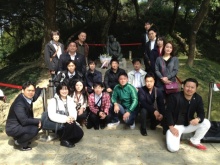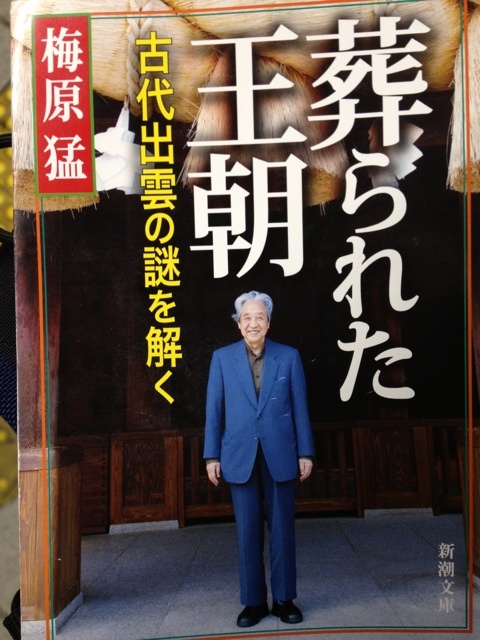アメリカに対して靖国参拝の正当性を訴えてもなかなか伝わらないですね。
昨日もそんな勉強をしてきましたが、死者の魂に対する考え方からして違うのです。
日本人は正論を訴えようとしますが、国際社会では正論より、世論形成や空気作りが重要です。
孤立させられたら、また国連脱退になってしまいます(国際連盟のこと)。
日本とアメリカがもめて喜ぶのは中国。
そのあたりも考えながら、やらねばなりませんね。
米政府、日本に「靖国に再参拝しない保証を」要求 米紙報道
2014.01.24 夕刊フジ
米紙ウォールストリート・ジャーナル(電子版)は23日、複数の米政府当局者の話として、米政府が日本政府に安倍晋三首相が靖国神社を再び参拝しないとの保証を非公式に求めていると報じた。同紙によると、両政府は今後数週間オバマ米大統領が検討する4月訪日を円滑に行うための努力を加速させる。米政府は日中、日韓関係の悪化による地域の不安定化を懸念しており、靖国参拝自粛要請もその一環とみられる。
同紙によると、米政府は安倍首相が今後、中国や韓国を刺激するような言動を自制することも確実にしたい意向。過去の侵略と植民地支配に対する日本政府のこれまでの「おわび」の再確認を検討するよう、安倍首相に求めていくという。
特に日米韓3カ国の連携強化に向け、韓国との関係改善に取り組むよう日本に要請。韓国が問題視する従軍慰安婦問題への日本政府の対応も求めているとしている。ハーフ米国務省副報道官は23日の記者会見で、報道について「真実かどうか分からない」と述べた。(共同)
U.S. Seeks Abe Assurance He Won’t Visit War Shrine
Officials Are Seeking to Ease Tensions in East Asia
Jan. 23, 2014 10:35 a.m. ET
The wall street journal
WASHINGTON—U.S. officials say they are seeking assurances from Japan that Prime Minister Shinzo Abe won’t repeat a visit to a war shrine that angered China and South Korea and will ask Mr. Abe to consider reaffirming Tokyo’s previous formal apologies over World War II in a bid to ease tensions in East Asia.
But even as Washington looks for calm, Seoul and Beijing bristled again Thursday over new comments by Mr. Abe on his shrine visit, underscoring the challenges the U.S. faces in its diplomatic push.
U.S. officials said they were looking for assurances from Mr. Abe that he would refrain from further comments and actions that ruffled Japan’s neighbors, who are already suspicious of his policy agenda. The officials said they are conveying the requests privately through a series of diplomatic meetings in Washington and Tokyo.
The officials said they were urging Japan to reach out to South Korea to end their bickering, which is complicating efforts for the key U.S. allies to work together on broader regional challenges. And, the officials say, they are also asking Tokyo to take steps to address decades-old disagreements over forced prostitution at Japanese military brothels in World War II.
It isn’t clear what the U.S. would do if its requests are rebuffed. A Japanese Foreign Ministry spokesman declined to comment.
Mr. Abe’s Dec. 26 visit to the Yasukuni Shrine—criticized by Japan’s neighbors because the site honors 14 convicted war criminals among the millions of Japanese war dead—surprised and dismayed many in Washington and sparked outrage in Seoul and Beijing.
Mr. Abe, speaking at the World Economic Forum in Davos, Switzerland, on Wednesday, continued to defend the visit.
“I had no intention whatsoever to hurt the feelings of people in China and Korea,” he told the gathering of world leaders in a question-and-answer session after his keynote speech. He said his visit had generated a “major misunderstanding” and insisted he went there to pay his respects to the dead from Japanese wars through history.
Mr. Abe also appeared to target China’s recent territorial assertiveness in the East China Sea by saying “freedom of movement must remain secure” and added that trust in the region could be achieved only through dialogue and rule of law, “not by force or coercion.”
In Beijing Thursday, Foreign Ministry spokesman Qin Gang rejected Mr. Abe’s explanation over the shrine visit.
“The Yasukuni Shrine is the spiritual tool and symbol of the Japanese militarism used to wage a war of aggression during World War II,” Mr. Qin said. He rejected criticism of Beijing’s territorial moves. “The purposes and policies of China’s defense are transparent,” he said.
Officials in Seoul also responded sharply to Mr. Abe’s comments.
“It’s totally contradictory to talk about forging friendly ties with South Korea while continuing visits to Yasukuni Shrine,” South Korean Foreign Ministry spokesman Cho Tai Young said.
Washington, too, is growing increasingly vocal over the tensions.
Caroline Kennedy, the new American ambassador to Japan, criticized Mr. Abe’s shrine visit in an interview published Thursday in the Asahi Shimbun newspaper.
“The United States is concerned about tensions in the region, and we were disappointed by the prime minister’s decision,” Ms. Kennedy was quoted by the Japanese newspaper as saying—a rare public rebuke from a top U.S. diplomat.
Daniel Russel, assistant secretary of state in charge of East Asian affairs, said in a speech last week that “helping Japan to deal with the historical issues that create tensions, and even estrangement sometimes, with its neighbors” posed a significant challenge for the U.S. in Asia this year. Other challenges he mentioned included China’s territorial disputes and North Korea’s nuclear and missile programs.
“There is some repair work that needs to happen,” said Sheila Smith, senior fellow for Japan studies at the Council on Foreign Relations. “I think our government was very surprised” by the shrine visit. “It opened up the possibility that Prime Minister Abe and the Obama administration may have different assessments of risk involved in those historical issues.”
Further adding to the diplomatic hurdles that Tokyo and Washington face, voters in the small town of Nago in Okinawa on Sunday re-elected their mayor, a staunch opponent of Mr. Abe’s plan to relocate a U.S. military base there. Mayor Susumu Inamine doesn’t have the authority to block the relocation plan, but his victory fuels doubts about the viability of the base plan—already stalled for 18 years—and possibly delays a broader plan to reshuffle U.S. troops stationed in Asia-Pacific at a time of rising regional tension.
In another wrinkle, U.S. Sen. Marco Rubio, a Florida Republican, met with Mr. Abe in Tokyo on Tuesday and praised Mr. Abe’s policies to bolster national defense, adding the potential that Tokyo could feel that it’s receiving mixed messages from Washington.
U.S. President Barack Obama is scheduled to visit Asia in April, and both U.S. and Japan officials hope he’ll stop in Japan. Over the next several weeks, the two sides will accelerate diplomatic efforts to smooth things over. On Jan. 17, Shotaro Yachi, head of Mr. Abe’s newly-established National Security Council, visited top U.S. officials including Secretary of State John Kerry and National Security Adviser Susan Rice. Bill Burns, deputy secretary of state, and Mr. Russel are traveling to Tokyo this week.
“After the Yasukuni visit, the most important thing that the prime minister can do is to demonstrate to President Obama that he has a game plan for moving forward with Korea,” said Michael Green, senior vice president for
Asia at the Center for Strategic and International Studies.
No summit meeting has taken place since Mr. Abe and South Korea President Park Geun-hye took the reins of their respective governments last winter.
Some experts think that now that Mr. Abe has fulfilled his long-stated desire to visit Yasukuni as national leader, he will show more restraint. But others say sky-high approval ratings and strong domestic support for the shrine visit will only embolden him to pursue his nationalist agenda.
“The U.S. could drive Mr. Abe into a corner if it pressures him in a wrong way,” said Tsuneo Watanabe, director of policy research at Tokyo Foundation, a private think tank. “The Abe administration is enjoying strong popularity and support from young people. Part of them feel, ‘Why do we have to listen to these people?'”
Some analysts say the Yasukuni visit, though poisonous, isn’t enough to change the U.S.’s views and policies toward Japan fundamentally.
“We are OK now but we can’t keep doing it too much,” said James Schoff, a senior associate on Japan at Carnegie Endowment for International Peace. “It’s like bending a paper clip back and forth. It gets weaker and weaker the more you bend it.”
—Andrew Browne, Min Sun Lee and Carlos Tejada contributed to this article.











